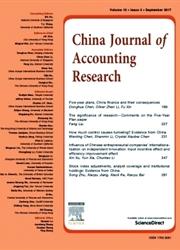Differentiated governance of executive compensation in Chinese state-owned enterprises
IF 4
Q2 BUSINESS, FINANCE
引用次数: 0
Abstract
In the context of differentiated governance and the deepening market-oriented reform of compensation in China, we divide state-owned enterprises (SOEs) into four categories according to their equity structure, namely absolute holding firms, relative holding firms, major impact firms and equity participation firms, to examine the current situation and effectiveness of differentiated governance for executive compensation. We report four main findings. First, executive compensation levels, compensation gaps and equity incentives increase as government control decreases, indicating the emergence of differentiated governance of executive compensation in SOEs. Second, the driving force behind differentiated compensation is the government’s willingness to intervene in SOEs. The government’s ability to intervene in SOEs is not diminished by reduced equity control, and the government may even compensate for such a reduction by appointing excess executives. Third, differentiated governance of compensation is more prominent in local and competitive SOEs, while equity incentives lag significantly behind salary levels and salary gap incentives. Fourth, differentiated governance of compensation levels and gaps are effective in reducing agency problems and enhancing innovation in SOEs; however, the impact of equity incentives is limited. These findings enrich the literature on the differentiated governance of SOEs and facilitate a more comprehensive understanding of executive incentive and compensation contracts in Chinese SOEs.
中国国有企业高管薪酬的差异化治理
在差别化治理和薪酬市场化改革不断深化的背景下,本文将国有企业按照股权结构分为绝对控股企业、相对控股企业、大影响企业和参股企业四类,考察高管薪酬差别化治理的现状和有效性。我们报告了四个主要发现。首先,高管薪酬水平、薪酬差距和股权激励随着政府控制的减少而增加,表明国有企业高管薪酬出现了差异化治理。第二,差别化薪酬背后的驱动力是政府干预国有企业的意愿。政府干预国有企业的能力不会因为股权控制的减少而减弱,政府甚至可能通过任命过多的高管来弥补这种减弱。第三,薪酬差异化治理在地方国企和竞争性国企中更为突出,股权激励明显滞后于薪酬水平和薪酬差距激励。第四,对薪酬水平和薪酬差距进行差别化治理,可以有效减少国有企业的代理问题,促进国有企业的创新;然而,股权激励的影响是有限的。这些发现丰富了有关国有企业差异化治理的文献,有助于更全面地理解中国国有企业高管激励与薪酬契约。
本文章由计算机程序翻译,如有差异,请以英文原文为准。
求助全文
约1分钟内获得全文
求助全文
来源期刊

China Journal of Accounting Research
BUSINESS, FINANCE-
CiteScore
4.70
自引率
0.00%
发文量
295
审稿时长
15 weeks
期刊介绍:
The focus of the China Journal of Accounting Research is to publish theoretical and empirical research papers that use contemporary research methodologies to investigate issues about accounting, corporate finance, auditing and corporate governance in the Greater China region, countries related to the Belt and Road Initiative, and other emerging and developed markets. The Journal encourages the applications of economic and sociological theories to analyze and explain accounting issues within the legal and institutional framework, and to explore accounting issues under different capital markets accurately and succinctly. The published research articles of the Journal will enable scholars to extract relevant issues about accounting, corporate finance, auditing and corporate governance related to the capital markets and institutional environment.
 求助内容:
求助内容: 应助结果提醒方式:
应助结果提醒方式:


